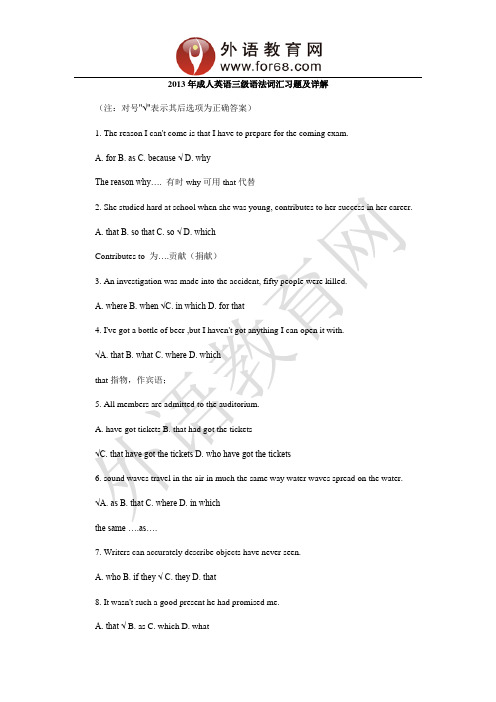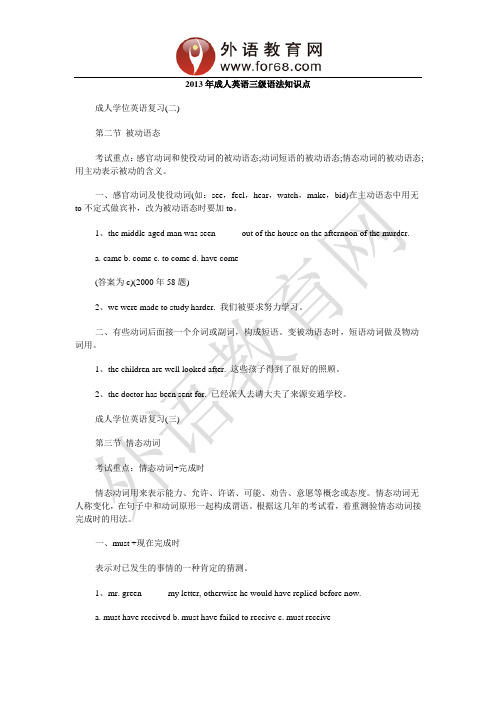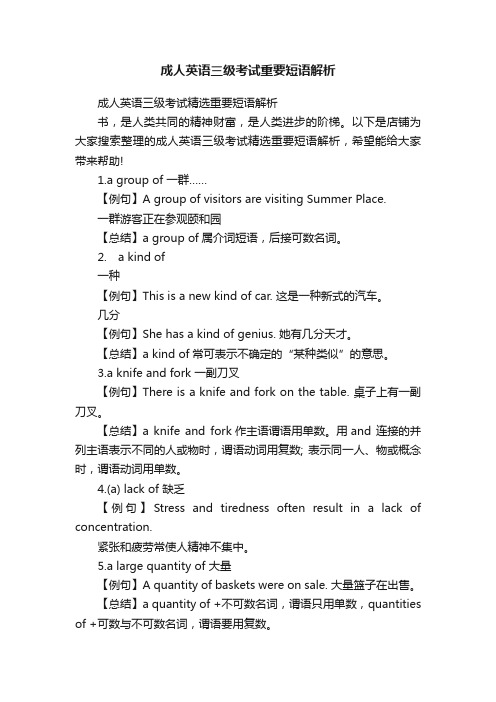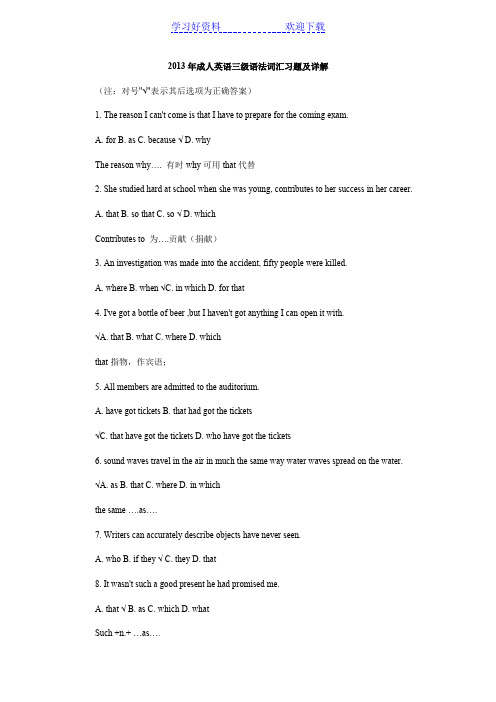2013年成人英语三级考试语法汇总大全
2013成人英语三级语法词汇习题及详解八

⽆忧考为⼤家整理的2013年成⼈英语三级语法词汇习题及详解⼋,供⼤家参考:(C)1. This watch is not worthy the gold belt.A. inB. atC. ofD. with be worthy of… belt 表带 (C)2. Mother will be much pleased your new discovery in astronomical science.A. ofB. inC. withD. on be pleased with… (D)3. John must have been dissatisfied his achievement in computer science for he working further in the field.A. forB. aboutC. onD. with be satisfied with… be dissatised with…. 对……感到满意(不满意) (B)4. I am accustomed late on weekends for I have the habit of working at night.A. to sit upB. to sitting upC. at sitting upD. for sitting up be accustomed to doing…=be used to doing… 习惯于…… (C)5. Tompson was once summoned to the court of law and accused being involved in a murder case.A. withB. onC. ofD. about on account of… due to… because of… 由于因为 (A)6. Smoking is not good you because it can affect your health.A. forB. atC. toD. on be good at…擅长 be good for… 对……有好处 (C)7. Mary's younger brother, though 6 years old, is very quick doing calculations.A. ofB. onC. inD. by be quick in(at) doing… 敏于做…… (A)8. The teacher will ask you to account your absence from his class yesterday.A. forB. atC. nD. of account for 解释(原因) (A)9. The flyover at the crossing on the 4th Ring Road is now construction.A. underB. atC. inD. with under 在……之中在……情况下 (A)10. People's complaints the bad food were soon taken consideration by the government.A. of…intoB. for…onC. of…forD. with…against complain v. complaint n. complain to sb. about(of)… 就……向……投诉 take into consideration 把……考虑在内 (B)11. I have no objection his staying in the library as long as he keeps quiet.A. ofB. toC. inD. over have no objection to 赞成 have an objection to 不赞成 (B)12. Morris's fluency in English has given her some advantage other pupils in the class.A. aboveB. overC. thanD. beyond have the advantage over 胜过; take advantage of 利⽤ (B)13. They have been trying at practical solution the marital problem.A. inB. toC. onD. for the solution to the problem 解决问题的⽅式 (B)14. The manager assured the customer that his complaint would be soon seen .A. atB. toC. onD. by be see to 注意;修理;处理 (C)15. How close parents are to their children can produce some strong influence their children.A. inB. atC. onD. for influence on + n. 对……的影响; influence …to do…; influence…in doing… 影响…… (B)16. Washington D.C was named the first President of the U.S.A., George Washington.A. fromB. afterC. byD. with name sb….after… 以……命名某⼈为…… (A)17. Everyone is busy the examination in the classroom. A with B. for C. on D. under be busy with + n. be busy doing… (C)18. Mary took her boyfriend the hand and then they walked away arm in arm. A.on B.at C.by D.for by the hand ⼿挽⼿ arm in arm 肩并肩 (A)19. Will all those the proposal raise your hands?A. in relation toB. in favor ofC. in contrast toD. in excess of (超过) in favor of ⽀持;赞同 in relation to 关于 in contrast to 与……截然不同 (A)20. Before 1920s, American women were deprived the right to vote to a large extent.A. ofB. toC. formD. with deprive of the right to vote 剥夺选举权 (A)21. China would supply $300,000,000 some African countries as support for they were suffering from some famines(饥荒)。
成人英语三级考试英语语法常考句型(必背)资料

成人英语三级考试英语语法常考句型(必背)成人英语三级考试:英语语法常考句型(1)主语+不及物动词+现在分词/过去分词说明:1.本句型中的谓语动词由不及物动词充当,分词作状语。
2.现在分词短语作状语时通常表示主语正在进行的另一个动作,起陪衬或修饰作用。
3.过去分词(短语)作状语时,主要修饰谓语动词,表示动作发生的背景与情况。
4.现在分词/过去分词(短语)作状语时,其逻辑主语与句子是一致的。
例:a)They sat facing each other.他们面对面地坐着。
b)He lay on the grass enjoying the sunshine.他躺在草地上享受阳光。
c)Frustrated, he went back to his home village.他大失所望,回到家乡去。
d)Supported by the people, our troops struck back with guns and grenades.在人民的支持下,我军以步枪和手榴弹进行了反击。
(2)主语+及物动词+动词不定式说明:1.本句型中宾语由动词不定式充当。
2.本句型中的动词不定式可用被动式和完成式。
3.本句型中的动词不定式可在to前加not或never表示否定。
4.可接动词不定式作宾语的动词主要有:expect, hope, want, wish,apply, ask, manage, arrage, prepare, agree, promise, trouble, hilp,decline, choose, fail等。
例:a)He would admire to be a pilot.他喜欢当飞行员。
b)The scientist claims to have discovered a new planet.这位科学家宣称发现了一颗新的行星。
c)They pretended not to see us.他们佯装没有看见我们。
2013年成人英语三级语法词汇习题及详解

2013年成人英语三级语法词汇习题及详解(注:对号"√"表示其后选项为正确答案)1. The reason I can't come is that I have to prepare for the coming exam.A. forB. asC. because √D. whyThe reason why…. 有时why可用that代替2. She studied hard at school when she was young, contributes to her success in her career.A. thatB. so thatC. so √D. whichContributes to 为….贡献(捐献)3. An investigation was made into the accident, fifty people were killed.A. whereB. when √C. in whichD. for that4. I've got a bottle of beer ,but I haven't got anything I can open it with.√A. that B. what C. where D. whichthat指物,作宾语;5. All members are admitted to the auditorium.A. have got ticketsB. that had got the tickets√C. that have got the tickets D. who have got the tickets6. sound waves travel in the air in much the same way water waves spread on the water. √A. as B. that C. where D. in whichthe same ….as….7. Writers can accurately describe objects have never seen.A. whoB. if they √C. theyD. that8. It wasn't such a good present he had promised me.A. that √B. asC. whichD. whatSuch +n.+ …as….9. Perhaps the day will come people will be able to breath e clean air in cities.√A. when B. while C. as D. since先行词为the day ;10. To make up an objective test, the teacher writes a series of questions, has only on correct answer.√A. each of which B. come of which C. which D. what信号词为has ;11. All is a continuous supply of the basic necessities of life.A. what is needed √B. that is neededC. for our needsD. thing needed12. Evidence came up specific speech sounds are recognized by babies as young as six months old.A. whichB. what √C. thatD. whenEvidence 证据;specific 明显的;13. The goals he had fought all his life no longer seemed important to him.A. for that √B. for whichC. for whatD. of them14. Those were the soldiers to save the town.√A. whose responsibility was B. in whom there was a responsibilityC. whose was the responsibilityD. from whom the responsibility15. The person you were talking to was an American.A. who √B. whomC. whichD. as16. Einstein was one of the greatest men ever lived.A. who √B. thatC. whomD. he泛指人时常用that ;17.Most of the electronic devise of this kind, manufactured or thispurposes, are tightly packed.A. which is √B. as areC. what areD. they are18. Scientists call Newton's idea gravitation reaches throughout the universe the law of universal gravitation.A. whenB. which √C. thatD. where19. English words are not always spelt .√A. the way they sound B. the way they to soundC. the way they are soundingD. as they are sounding20. Snowdonia is a seashore city you can enjoy yourselves much by visiting the local scenic spots.A. whyB. which √C. whereD. so先行词表地点;21. The time is not far away modem communications will become widespread in China's vast countryside.√A. when B. before C. until D. as先行词表时间;22. A higher crime rate exists in cities a large percentage of unemployment .A. where have √B. that haveC. which they haveD. that having23. The inflation made it hard for us to buy the necessities .A. which need us √B. that we needC. what we needD. as we need。
2013年成人英语三级语法知识点

2013年成人英语三级语法知识点成人学位英语复习(二)第二节被动语态考试重点:感官动词和使役动词的被动语态;动词短语的被动语态;情态动词的被动语态;用主动表示被动的含义。
一、感官动词及使役动词(如:see,feel,hear,watch,make,bid)在主动语态中用无to不定式做宾补,改为被动语态时要加to。
1、the middle-aged man was seen _____ out of the house on the afternoon of the murder.a. cameb. comec. to comed. have come(答案为c)(2000年58题)2、we were made to study harder. 我们被要求努力学习。
二、有些动词后面接一个介词或副词,构成短语。
变被动语态时,短语动词做及物动词用。
1、the children are well looked after. 这些孩子得到了很好的照顾。
2、the doctor has been sent for. 已经派人去请大夫了来源安通学校。
成人学位英语复习(三)第三节情态动词考试重点:情态动词+完成时情态动词用来表示能力、允许、许诺、可能、劝告、意愿等概念或态度。
情态动词无人称变化,在句子中和动词原形一起构成谓语。
根据这几年的考试看,着重测验情态动词接完成时的用法。
一、must +现在完成时表示对已发生的事情的一种肯定的猜测。
1、mr. green _____ my letter, otherwise he would have replied before now.a. must have receivedb. must have failed to receivec. must received. must fail to receive(答案:b)(1998年44题)2、i believe he _____ an accident, otherwise he would have arrived on time.a. would have hadb. could have hadc. should have hadd. must have had(答案为d)(2001年58题)成人学位英语复习(四)第四节虚拟语气如果所表示的条件根本不可能实现或实现的可能性很小时,称为虚拟条件句。
成人英语三级考试重要短语解析

成人英语三级考试重要短语解析成人英语三级考试精选重要短语解析书,是人类共同的精神财富,是人类进步的阶梯。
以下是店铺为大家搜索整理的成人英语三级考试精选重要短语解析,希望能给大家带来帮助!1.a group of 一群……【例句】A group of visitors are visiting Summer Place.一群游客正在参观颐和园【总结】a group of属介词短语,后接可数名词。
2. a kind of一种【例句】This is a new kind of car. 这是一种新式的汽车。
几分【例句】She has a kind of genius. 她有几分天才。
【总结】a kind of常可表示不确定的“某种类似”的意思。
3.a knife and fork 一副刀叉【例句】There is a knife and fork on the table. 桌子上有一副刀叉。
【总结】a knife and fork作主语谓语用单数。
用and 连接的并列主语表示不同的人或物时,谓语动词用复数; 表示同一人、物或概念时,谓语动词用单数。
4.(a) lack of 缺乏【例句】Stress and tiredness often result in a lack of concentration.紧张和疲劳常使人精神不集中。
5.a large quantity of 大量【例句】A quantity of baskets were on sale. 大量篮子在出售。
【总结】a quantity of +不可数名词,谓语只用单数,quantities of +可数与不可数名词,谓语要用复数。
a couple of 一对,两,一双【例句】两个There is a couple of boys waiting for you.有两个男孩等你。
一些,几个He must have a rest for a couple of weeks.他必须休息几个星期【总结】a couple of + n(c).作主语时谓语动词通常用单数,接可数名词复数a crowd of 一群、许多【例句】There is a crowd of papers and books is on his desk.有大堆文件和书籍在他的桌子。
成人英语三级考试《词汇与语法》专项备考资料2

成人英语三级考试《词汇与语法》专项备考资料21.定义:用作表语的从句叫做表语从句。
2.构成:关联词+简单句3.引导表语从句的关联词的种类:(1) 从属连词that.如:The trouble is that I have lost his address. 麻烦是我把他的地址丢了。
(2) 从属连词whether, as, as if.如:He looked just as he had looked ten years before. 他看起来还与十年前一样。
The question is whether they will be able to help us. 问题是他们是否能帮我们。
注:从属连词if 一般不用来引导表语从句,但as if 却可引导表语从句,如:All this was over twenty years ago, but it’s as if it was only yesterday.这都是20 多年前的事了,但宛如昨天一样。
能跟表语从句的谓语动词一般为系动词be, seem, look 等。
如:It looked as if it was going to rain. 看起来天要下雨了。
(3)连接代词who, whom, whose, what, which, whoever, whatever, whichever连接副词where, when, how, why.如:The problem is who we can get to replace her. 问题是我们能找到谁去替换她呢。
The question is how he did it. 问题是他是如何做此事的。
That was what she did this morning on reaching the attic. 那就是她今晨。
成人英语三级语法词汇习题及详解

2013年成人英语三级语法词汇习题及详解(注:对号"√"表示其后选项为正确答案)1. The reason I can't come is that I have to prepare for the coming exam.A. forB. asC. because √D. whyThe reason why…. 有时why可用that代替2. She studied hard at school when she was young, contributes to her success in her career.A. thatB. so thatC. so √D. whichContributes to 为….贡献(捐献)3. An investigation was made into the accident, fifty people were killed.A. whereB. when √C. in whichD. for that4. I've got a bottle of beer ,but I haven't got anything I can open it with.√A. that B. what C. where D. whichthat指物,作宾语;5. All members are admitted to the auditorium.A. have got ticketsB. that had got the tickets√C. that have got the tickets D. who have got the tickets6. sound waves travel in the air in much the same way water waves spread on the water. √A. as B. that C. where D. in whichthe same ….as….7. Writers can accurately describe objects have never seen.A. whoB. if they √C. theyD. that8. It wasn't such a good present he had promised me.A. that √B. asC. whichD. whatSuch +n.+ …as….9. Perhaps the day will come people will be able to breath e clean air in cities.√A. when B. while C. as D. since先行词为the day ;10. To make up an objective test, the teacher writes a series of questions, has only on correct answer.√A. each of which B. come of which C. which D. what信号词为has ;11. All is a continuous supply of the basic necessities of life.A. what is needed √B. that is neededC. for our needsD. thing needed12. Evidence came up specific speech sounds are recognized by babies as young as six months old.A. whichB. what √C. thatD. whenEvidence 证据;specific 明显的;13. The goals he had fought all his life no longer seemed important to him.A. for that √B. for whichC. for whatD. of them14. Those were the soldiers to save the town.√A. whose responsibility was B. in whom there was a responsibilityC. whose was the responsibilityD. from whom the responsibility15. The person you were talking to was an American.A. who √B. whomC. whichD. as16. Einstein was one of the greatest men ever lived.A. who √B. thatC. whomD. he泛指人时常用that ;17.Most of the electronic devise of this kind, manufactured or thispurposes, are tightly packed.A. which is √B. as areC. what areD. they are18. Scientists call Newton's idea gravitation reaches throughout the universe the law of universal gravitation.A. whenB. which √C. thatD. where19. English words are not always spelt .√A. the way they sound B. the way they to soundC. the way they are soundingD. as they are sounding20. Snowdonia is a seashore city you can enjoy yourselves much by visiting the local scenic spots.A. whyB. which √C. whereD. so先行词表地点;21. The time is not far away modem communications will become widespread in China's vast countryside.√A. when B. before C. until D. as先行词表时间;22. A higher crime rate exists in cities a large percentage of unemployment .A. where have √B. that haveC. which they haveD. that having23. The inflation made it hard for us to buy the necessities .A. which need us √B. that we needC. what we needD. as we need。
英语三级考试虚拟语气用法总结

2013 年成人英语三级考试虚拟语气用法总结在英文中表示虚拟的情况不但有虚词的提示,谓语动词也要相应的变化。
虚拟语气是英语三级考试的必考知识点之一,也是体现英汉语言习惯区别的一个语法现象。
在汉语里表示假设虚拟的情况常用一些虚词来表示,例如“假设”、“如果”等,而英文中表示虚拟的情况不但有虚词的提示,谓语动词也要相应的变化。
虚拟语气的基本作用是:(1)表达假设的情况与事实相反;(2)表达异想天开很难实现的愿望;(3)表达建议命令劝告等语气。
本部分重点讲 if 引导的虚拟条件句,含蓄条件句、特殊结构中虚拟语气, should+ 及动词原形的用法。
1、虚拟语气的基本形式和用法虚拟(条件)语气中,主句与从句中谓语动词的形式可分为下面三类:假设类型条件从句谓语动词形式主句谓语动词形式与现在事实相反If+动词的过去式 (be 用 were 而不用 was)would(第一人称可用 should)+ 动词原形与过去事实相反 If+had+过去分词 would(第一人称可用 should)+have+过去分词与将来事实相反 If+were to+动词原形或 If+should+动词原形 would(第一人称可用should)+动词原形下面我们列举今年的真题来强化记忆。
例 1 Mary said tome,“Had I seen your bag,I ____ _ it to you.” A.will return B.must return C.could return D.would have returned 【答案】D(2004 年 4 月 45 题) 例 2 I would ask George to lend us the money if I ____ _ him. A.would come B.would have come C.had come D.came 【答案】C(1995 年 38 题) 例 3 If Bob ____ _ with us,he would have had a good time. A.would come B.would have come C.had come D.came【答案】C(1995 年 59 题) 1、省略 if 的虚拟形式在虚拟条件句中,如谓语包含were,had,should 等词,则可以把这些词放到主语前面,省略 if。
- 1、下载文档前请自行甄别文档内容的完整性,平台不提供额外的编辑、内容补充、找答案等附加服务。
- 2、"仅部分预览"的文档,不可在线预览部分如存在完整性等问题,可反馈申请退款(可完整预览的文档不适用该条件!)。
- 3、如文档侵犯您的权益,请联系客服反馈,我们会尽快为您处理(人工客服工作时间:9:00-18:30)。
成人英语三级培训:/kcnet1810/
3
� Tom is a handsome boy. The two boys are students. � His boy needs Tom's pen. The boy in the classroom needs a pen of yours. � The boy needs a ball pen. The best boy here is Tom. � There is nothing to do today. The smiling boy needs a pen bought by his mother. � This is the new dictionary which I bought yesterday. 7、状语:状语修饰动词、形容词、副词或全句,说明方式、因果、条件、时间、地点、让 步、方向、程度、目的等。 � 1) She sings quite well. � 2) On Sundays, there is no student in the classroom. � 3) He sits there, asking for a pen. � 4) The boy needs a pen to do his homework. � 5) If I have some spare time, I will read some story-books. 8、同位语是在名词或代词之后并列名词或代词对前者加以说明的成分,近乎于后置定语。 如: � We students should study hard. / (students是we的同位语,都是指同一批‘学生’) � We all are students. / (all 是 we 的同位语,都指同样的‘我们’) 二、词法分析 (一)构词法 1.转化法: 把一种词性用作另一种词性而词形不变的方法,学位英语最常考的是形容词转化为名 词。表示颜色的形容词常可转化为名词:You should be dressed in black at the funeral.你在葬礼 中该穿黑色衣服。 I want to write in red.我想用红笔写字。 某些形容词如old, young, poor, rich, wounded, injured等与the连用,表示一类人,作主语 时,谓语用复数 The old in our village are living a happy life.我们村的老年人过着幸福的生活。 2.派生法 1)前缀 除少数前缀外,前缀一般改变单词的意义,不改变词性;后缀一般改变词类,而不引起词义 的变化。 (1)表示否定意义的前缀常用的有dis-, il-, im-, in-, ir-, mis-, non-, un-等,在单词的前面加这类 前缀常构成与该词意义相反的新词。例如: appear出现→disappear消失,correct正确的→incorrect不正确的,lead带领→mislead领错、误 导,stop停下→non-stop不停。 (2)表示其他意义的前缀常用的有a-(多构成表语形容词), anti- (反对;抵抗), auto- (自动), co(共同), en- (使), inter- (互相), re- (再;又), sub- (下面的;次;小), tele- (强调距离)等。例如: alone单独的 antigas防毒气的 autochart自动图表 cooperate合作 enjoy使高兴 internet互联网 reuse再用 subway地铁 telephone电话 2)后缀 英语单词不仅可以通过加前缀构成新词, 也可加后缀构成新词。 后缀通常会改变单词的词性, 构成意义相近的其他词性;少数后缀还会改变词义,变为与原来词义相反的新词。 (1)构成名词的后缀常用的有-ence,-(e)r/ -or (从事某事的人),-ese (某地人),-ess (雌性),-ful (一……),-ian (精通……的人),-ist (专业人员),-ment (性质;状态),-ness (性质;状态),
成人英语三级培训:/k说明的人或物,可以作主语的成分有名词,主语一般在句首。注意名词单 数形式常和冠词不分家! � 1) Mr. Lee is a well-known scientist.名词作主语 � 2) He reads newspapers everyday.代词作主语 � 3) Two and ten is twelve.数词作主语 � 4) Smoking is harmful to the health.动名词作主语 � 5) To swim in that pool is a great pleasure.动词不定式作主语 � 6) What we shall do next is not yet decided.从句作主语 2、谓语: 说明主语的动作,状态或特征 � 1) The new term begins on the 1st of September. � 2) His father is an engineer. � 3) She seemed happy. � 4) Li Hua showed me his album. 3、宾语:指的是及物动词涉及到的人或物 � 1) Wang Ling lent me a novel to read in the bus. � 2) The medicine is good for a cold. � 3) How many pieces do you want? � 4) My little sister always likes to ask questions. � 5) Would you mind coming earlier tomorrow? � 6) He asked me what I was going to do tonight 4、宾语补足语:在宾语后面补充说明宾语的动作、状态、特征。 � 1) The government appointed(任命)her chief delegate (首席代表)to the conference. � 2) I don’t believe the story true. � 3) You should put your things in order(有序). � 4) The doctor advised her to stay in bed for a week. � 5) We saw the pupils playing basketball. 5、表语:位于系动词如be之后,说明主语身份,特征,属性或状态。 � 1)Wang’s father is a doctor. � 2) He is always careless. � 3) The basketball match is on. � 4) All the pupils are on the playground now. � 5) Our aim is to win more medals. � 6) His work is teaching French. � 7) The question is who can really repair the machines. 还有位于以下系动词后面的词,我们也称之为表语: 表示感官的:look\seem(看起来) 、sound(听起来)、smell(闻起来)、taste(尝起来) 、 feel(感觉起来): He looks disappointed(形容词作表语)他看起来很失望。 The rubbish smells terrible.垃圾很难闻。 表示变化的:get、become、turn(变得)。It becomes hotter and hotter(形容词作表语). 天 变得越来越热了。 6、定语:是对名词或代词起修饰、限定作用的词、短语或句子,翻译常用‘……的’表示。
成人英语三级培训:/kcnet1810/
1
2013年成人英语三级考试语法汇总大全
一、句法分析..........................................................................................................................2 二、词法分析..........................................................................................................................3 三、时 态...............................................................................................................................9 四、被动语态........................................................................................................................12 五、情态动词........................................................................................................................13 六、不定式............................................................................................................................15 七、定语从句........................................................................................................................18 八、主语从句........................................................................................................................23 九、表语从句........................................................................................................................24 十、宾语从句........................................................................................................................24 十一、同位语从句................................................................................................................25 十二、状语从句....................................................................................................................26 十三、虚拟语气....................................................................................................................29 十四、动名词........................................................................................................................32 十五、现在分词....................................................................................................................32 十六、过去分词....................................................................................................................36 十七、独立主格结构............................................................................................................38 十八、倒装句型....................................................................................................................39 十九、强调句型....................................................................................................................40 二十、主谓一致....................................................................................................................41 二十一、It的用法.................................................................................................................43
